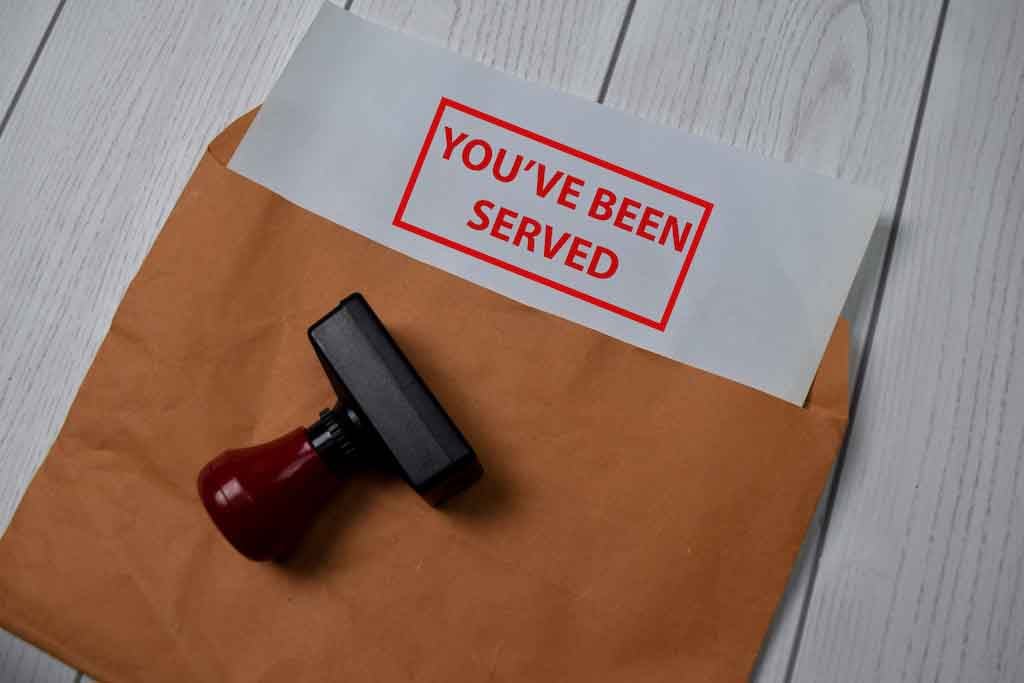Service of process is one of the core offerings at ABC Legal Services. As such, it's one of the most frequently examined and explained processes by our teams. In this first article in our new series, “Between the Lines” I’ll be walking through service of process and process servers.
.jpg?width=604&name=iStock-1196084882%20(1).jpg)
What is Service of Process?
Service of process is the series of actions taken to alert a party of their involvement in a legal proceeding or lawsuit. Generally, laws around the nuances of service of process are driven at the state level in the United States. These regulations outline specifications regarding when, where and how legal papers must be presented to a defendant for them to have been considered legally notified of the proceedings. If service of process cannot be verified or is considered bad service, a judge can dismiss proceedings. The plaintiff would be required to start the case anew - get a new court date, create new documents and ensure the documents are properly served to move forward.
For more on service of process check out “Service of Process and Methods of Service” by the VP of Products at ABC Legal Services, Sascha Mehlhase.
What and Who Needs to be Served?
A lawsuit starts when a party files a complaint or petition with a court. The court will create a summons, which documents the complaint and formally alerts defendants that they have a lawsuit against them. Certain cases require other documents to be served based on the type of lawsuit being filed and local regulations. Accurate or true copies of each of these documents must be delivered to each defendant in a case.
Cases against a person or people must have documents delivered to each adult listed in the suit. Cases targeting partnerships, corporations, or entities (counties, cities, states, etc) have different requirements and agents to whom the documents must be delivered. This page from California Courts outlines how requirements may shift for groups.
Who Can Serve Papers?
The restrictions on who can serve legal documents are not too constrictive, but can vary slightly by state. Generally, documents must be served by an unbiased third-party, an adult that is not involved with the case. It can be neither the plaintiff(s) nor the defendant(s) and the person cannot benefit or be affected by the outcome of the case. Some states, such as Oregon, require that the person performing service live in the state the defendant resides within. The papers must be served in accordance with state regulations regarding how the documents are served, when service attempts were made and how the service is verified.
In many jurisdictions, a local sheriff or law officer can be hired to serve documents as well. It’s always best to consult the regulations in your area to ensure that service is conducted in accordance with the law. Due to the complexities and liabilities involved in service of process, it’s often a good choice to use a process server to complete service of process.
How Do You Serve Papers?
The unbiased third party selected by the plaintiff (or by their attorney) must deliver the papers to the defendant(s).It’s best to provide direct or personal service, which involves physically handing the documents to the defendants. This involves delivering all required documents to the person(s) listed as defendants, ideally at each individual’s residence or in limited circumstances, place of work. After delivering the documents, proof of service documentation is required in most states. While serving documents, it's important to be aware of legal timelines applicable to the documents being served, local laws outlining proper service of process and regulations regarding trespassing.
Other Options for Service of Process
Substitute service involves delivering the documents to a competent adult living at the same residence or an adult responsible for his or her workplace or mail. Alternate service is available in some states and allows for an additional option for service, usually by certified mail or posting, and can only be attempted under specific circumstances or with the directive of the court. Both substitute and alternate services require additional paperwork and legal work. More details on the different methods of service of process are available here.
What is Proof of Service?
Proof of Service, return of service or an Affidavit of Service is a document that must be filled out to formally record and properly complete legally compliant service of process in most states. The document is signed by the person who serves the documents, swearing under oath that service was performed, recording who, where, how and to whom the papers were served, making them legally liable for the service. Filing an Affidavit of Service correctly and in a timely manner can affect the suit process immensely. In New York, for example, for service to be official, courts must receive the affidavit within 3 days of service in Landlord-tenant cases. In some courts, in cases where substitute or alternative service was performed, the defendant’s response or time to answer will not begin until the affidavit is filed.
What is a Process Server and Why Use One?
Process servers are trained professionals that act as an unbiased third party in service of process, delivering legal documents to the defendant. Different states have requirements such as licensing, registration, and/or certification processes for process servers. ABC Legal Services provides an updated list of the major requirements by state on our website. Generally, process servers must be over 18 years of age, have a valid driver’s license and have no criminal history. This overview published on the FTC website is from 2009, but gives a good idea of the intricacies of different state requirements.
Process servers regularly serve papers, so they are accustomed to dealing with the local legal processes as well as the reactions of the people being served. Their training combined with experience in their state allows a process server to provide service that is compliant to local laws and provide proper documentation and record-keeping of service that would be viable in court should the need arise. Additionally, since process servers are considered registered professionals, they are granted special access in certain states, such as California, to serve on private properties. In California, process servers are allowed into gated communities or apartment complexes for the purpose of serving the documents. Normally, this could be considered a violation of local trespassing laws.
How does ABC Legal Provide for Service of Process?
While some process servers act independently, it can be difficult to feel confident confirming process server credentials for individuals who need a process server, or to find a server to serve papers where they need to be served, especially for law firms or practices that deal with large quantities of cases in multiple states. Connecting with a legal services provider, such as ABC Legal Services, can be a simple way to reach a large network of process servers and streamline service of process alongside other services, such as e-filing and document retrieval.
ABC Legal Services has a network of process servers who live in and operate around the United States, allowing us to get papers served quickly and efficiently, wherever a document needs to be served. ABC Legal Services provides training to the process servers and requires active certifications or licenses to be on file, per local/state requirements, ensuring accurate and compliant service that will hold up in court.
Service of process jobs are made available to servers through our proprietary technology, which provides advanced documentation tools for service of process. Locations during service of process are confirmed with GPS data. Data about the service or service attempts can be recorded in real-time with time-stamps to validate when attempts occurred. Our servers are trained to observe and record details about the service and upload images as needed to document the process to ensure due diligence in their service.
Additionally, at ABC Legal Services there are options to integrate service of process with other services, such as investigations and skip-tracing for difficult-to-reach clients, venue protection for select states and cases with specific court-location filing requirements, e-filing where documents must be filed electronically, international services for cases that cross country boundaries, and appearance counsel to meet out of state court appearance requirements.
"Between the Lines" is meant to inform and empower your decisions around legal tech and help you get to know the people and processes powering ABC Legal Services’ products and services. Subscribe to the blog to stay up-to-date with our products, legal services and the legal tech industry.
About ABC Legal Services
ABC Legal is the nation’s leading service of process and court filing company and is the official process server to the U.S. Department of Justice. Docketly is a subsidiary of ABC Legal, providing appearance counsel on a digital, custom-built platform that smoothly integrates with our applications and services. ABC Legal’s applications are cloud-based and compatible for use on desktop, browser, and smartphones. Our solutions and digital approach ensure process server partners, law firm customers, and their clients save valuable time and resources when serving legal notices safely and with maximum compliance, control, and transparency. ABC Legal is based in Seattle, WA, with more than 2,000 process servers throughout the U.S., as well as internationally in more than 75 countries. To learn more about ABC Legal, our solutions, and subsidiary company Docketly, visit www.abclegal.com.

Written by
Heather ThomasService made simple—down the road and across the country. Join the 50,000+ professionals who trust ABC Legal for service of process.
Recent Posts
Subscribe to email updates
Popular posts
Learn More

Service of Process From The Ground Up

What are the Federal Rules for Service of Process?

What Qualifications Does a Registered Process Server Need?
.jpeg?width=500&height=334&name=Why%20you%20shouldn%E2%80%99t%20avoid%20being%20served%20with%20legal%20documents%20(process).jpeg)







